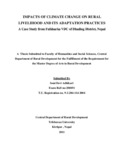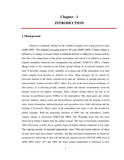Please use this identifier to cite or link to this item:
https://elibrary.tucl.edu.np/handle/123456789/2346| Title: | Impacts of Climate Change on Rural Livelihood and Its Adaptation Practices: A Case Study from Fulkharka VDC of Dhading District, |
| Authors: | Adhikari, Soni Devi |
| Keywords: | Climate change;Livelihood;Adaptation |
| Issue Date: | 2011 |
| Publisher: | Central Department of Rural Development Tribhuvan University, Kathmandu |
| Abstract: | limate change is one of the most serious challenges of this century for sustainable development whose impact is of great concern to humanity. Although Nepal has a negligible share in the global emissions of greenhouse gases, it is more vulnerable to climate change impact due to its fragile mountain ecosystems. A study entitled “Impacts of Climate Change on Rural Livelihoods and its Adaptation Practices: A Case Study from Fulkharka VDC of Dhading District” was carried out in Fulkharka VDC in Dhading district of Nepal, to assess people's understanding on climate change, explore its impacts on their livelihoods and document how they are coping with those impacts. Various PRA tools like household interview (n=51), group discussions (3), key informants survey (6) and trend analysis were used for collecting primary data. Meteorological data and different published & unpublished literatures were used for collecting secondary data. Data were analyzed using Ms-excel and SPSS-11.5 and presented using tables, graphs and diagrams. The first research question was how people understand the climate change. The study revealed that 41% respondents were familiar with the concepts and remaining had no idea on climate change but they understood that their local climate is changing in some or other way. Their perception on the warming coincides with the local meteorological data which depicts that the mean annual temperature is increasing by 0.062°C.Various methods of research and 43% responses shows that the timing pattern of rainfall, intensity and amount of rainfall also changed from 5-6 years. Similarly 97% respondents have experienced that the time of drought, temperature and other climatic factors have changed due to XI climate change. While assessing the impacts of climate change experienced by the people, results shows that the climate change had several impacts on the rural livelihoods. More than 97% people are agreed with the observed impacts were decreasing in agriculture production, loss in biodiversity. Only 2% respondents are not agreed with decreasing in water resources, and increase in health hazards. It has shifted the cropping pattern, changing the ripening time of various local fruits, different flora and fauna are going to endangered. The third research question was how the people were adapting to the changing climate. It was found that people applied some adaptation strategies such as changing cropping time, crop type and rain water harvesting, installing improved cooking stoves, plantation of plants, soil conservation. In the research area only 12% respondents have planted cash crops because of decreasing the productivity of traditional crops, Though they did not have enough knowledge about the mitigation measures, they were protecting forests, and maintaining home gardens that could reduce the rate and volume of greenhouse gas emissions. There is an urgent need to formulate adaptive strategies for changing climate in the agricultural field, health, water resources and biodiversity sector from concerned authorities. Awareness, capacity building, and knowledge could be extended at local level. Policy has to be developed at national level for managing future risks and for integrating climate risk management into development strategies |
| URI: | http://elibrary.tucl.edu.np/handle/123456789/2346 |
| Appears in Collections: | Rural Development |
Files in This Item:
| File | Description | Size | Format | |
|---|---|---|---|---|
| Cover.pdf | 294.12 kB | Adobe PDF |  View/Open | |
| Thesis.pdf | 869.05 kB | Adobe PDF |  View/Open |
Items in DSpace are protected by copyright, with all rights reserved, unless otherwise indicated.
